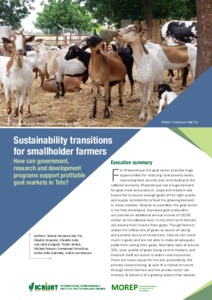Sustainability transitions for smallholder farmers: How can government, research and development programs support profitable goat markets in Tete?
Abstract
For Mozambique the goat sector provides huge opportunities for reducing rural poverty levels, improving food security and contributing to the national economy. Mozambique has a huge demand for goat meat and products. Large and medium size buyers fail to source enough goats of the right quality and supply consistently to feed the growing demand in urban markets. Despite its potential, the goat sector is not fully developed. Improved goat production can provide an additional annual income of US$50 million at the national level. In the short term farmers can double their income from goats. Though farmers realize the critical role of goats as source of saving and possible source of investment, they do not invest much in goats and are not able to make an adequate profit from selling their goats. Mortality rates of around 15%, poor quality of goats being sold to markets, and livestock theft are losses to entire rural economies. There are many causes for the low productivity, the primary reasons being: a) Lack of a market structure through which farmers and the private sector can interact; b) Absence of a grading system that rewards farmers for their investments in quality production; and c) Livestock theft that destroys community trust, and eventually hampers collective action among farmers

